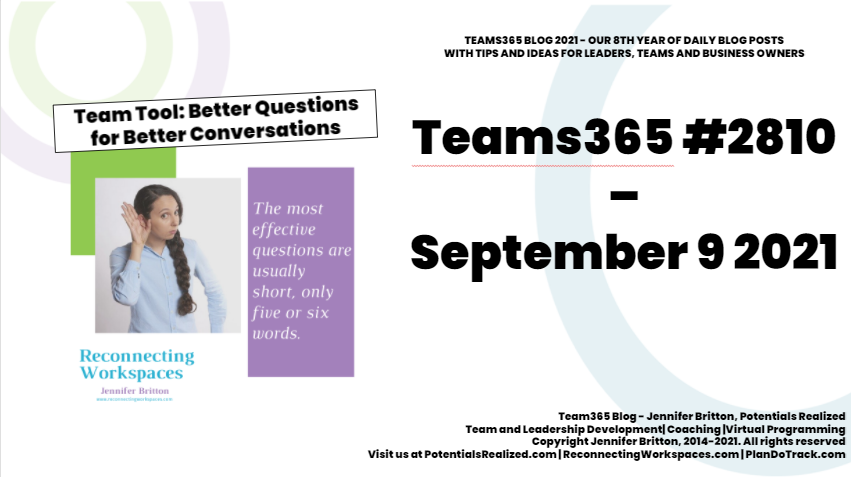Here’s what I share in Reconnecting Workspaces https://www.amazon.com/Reconnecting-Workspaces-Pathways-Thrive-Virtual/dp/0993791557
TEAM TOOL: ASK BETTER QUESTIONS, HAVE A BETTER CONVERSATION AND RESULTS
Questions can be used for different purposes: to expand awareness, prioritize, create clarity, make a decision, identify actions, or support accountability. Questions are an area we can all get better at.
Consider how you might use these types of questions:
QUESTIONS TO: EXAMPLES:
Expand Awareness
- What’s important about that?
- What are your assumptions?
- What perspective are you looking at this from?
- What’s another approach?
- What impact would that have?
- What’s the big picture or how does it fit in the big picture?
- What’s at the core?
- What else?
- What’s important?
- What’s urgent?
- What needs to get done first so that other things can get done?
- In the big picture, what’s needed?
- What could get deferred?
- If there was only one thing that could get done, what would
- that be?
- What’s the number one priority?
- What could get delegated?
- What can you say no to?
- What do you see as connected?
- If you could do only one thing, what would that be?
- What’s clear to you?
- What is important?
- What’s the priority?
- What’s possible in terms of outcome?
- What results are you aiming for?
- What’s most important?
- What’s a priority?
- What will success look like?
- What will work best in the short term?
- What will work best in the long term?
- What support do you need?
- What will you do in the next 24 hours?
- What are your next steps?
- What else?
- When will you check back in?
- Who will you check in with?
- What will you do by next week?
- What else do you need?
- What’s next?
Notice the overlap of some questions like “What else?” or “What’s the possibility?” These are stock questions which are really broad and open up the conversation in a variety of different ways.
Enjoy your reflection!
Jennifer
Jennifer Britton
Potentials Realized |Reconnecting Workspaces | Group Coaching Essentials
Team and Leadership Development | Coaching | Retreats
Follow us on Instagram @ReconnectingWorkspaces
Phone: (416)996-8326
Check out my TEDx talk at https://www.ted.com/talks/jennifer_britton_virtual_remote_and_hybrid_checklist_aug_2021
Looking to bring your workplaces back together, whether you are remote, hybrid, or face-to-face? Pick up a copy of my new book, Reconnecting Workspaces, at Amazon.

 RSS Feed
RSS Feed





